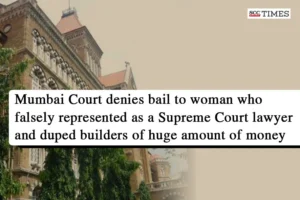Greater Bombay Sessions Court: In a bail application filed under Section 4391 of the Code of Criminal Procedure, 1973 (“CrPC”) before a Single Judge Bench of V.M. Sundale, Additional Sessions Judge, the applicant (“accused”) was accused of offences punishable under Sections 4202 and Section 4063 read with 344 of the Penal Code, 1860 (“IPC”). The accused was falsely representing as a practising lawyer/advocate of the Supreme Court and cheated the informant and others of huge sums of money, by assuring them to legally represent them for the redressal of their respective grievances. The Court noted that a total of 11 criminal offences of similar nature were registered against the accused in Maharashtra and Haryana and also noted the apprehensions of the investigating officer (“IO”) concerned, that the release of the accused on bail may result in further undertaking of similar offences by her, in pressuring of prosecution witnesses, and fleeing from justice. The Court found these apprehensions well-founded and denied bail to the accused.
Background
The case of the prosecution was that the informant was a builder and was looking for a lawyer to represent him in two legal proceedings. A friend of his introduced him to the accused, who represented herself as a practicing lawyer at the Supreme Court and assured the informant to represent him. She demanded a legal fee of Rs. 15,00,000 from the informant, out of which 10,00,000 was paid in advance to her.
Additionally, the informant, with fellow builders, was facing losses due to the non-availability of electricity supply for the continuation of construction, since the Maharashtra State Electricity Board (“MSEB”) had not installed electric transformers in the vicinity. The informant brought this issue to the accused’s attention, who assured to initiate appropriate legal proceedings to secure electricity transformers, however, she demanded a sum of Rs. 3 Crores, out of which, the informant and other builders agreed to pay Rs. 2.11 Crores.
Thereafter, a Memorandum of Understanding (“MoU”) was prepared between the builders and the accused. The accused’s driver received Rs. 51,00,000 therefrom. Thereafter, Rs. 20,00,000 was again sent and was received by the accused’s driver. However, the accused did not initiate any legal proceedings, as stipulated under the MoU. Hereafter, the informant inquired about the accused and learnt that she was not an advocate and had deceived several people in the same manner.
The IO also opposed the bail application by submitting that a total of nine criminal cases were registered against the accused, and if the accused was released on bail, there was a possibility of committing similar offences, of pressurising the prosecution witnesses, and fleeing away from justice. The informant also opposed the bail application on the similar grounds, as raised by the IO.
Court’s decision
The Court found that the accused was not a law graduate and a total of 11 criminal offences were registered against the accused in Maharashtra and Haryana, and that she had no permanent abode.
The Court stated that the accused had not only cheated the public at large but also attempted to disrespect the noble legal profession. The Court observed that the offence was serious and that there was sufficient prima facie evidence against the accused. The Court also viewed the apprehension of the IO regarding the pressurising of the prosecution witnesses and the fleeing from justice were well founded.
Therefore, considering the facts and circumstances, the Court held that it would not be proper to release the accused on bail. Hence, the bail application was rejected.
[Poonam Charandas Khanna v. State of Maharashtra, Criminal Bail Application No. 1624 of 2024, decided on 19-07-2024]
Advocates who appeared in this case :
For the applicant: Nasima Battiwala, Advocate
For the respondent: Ratnavali Patil, APP; Umesh Iyer, Advocate
Buy Code of Criminal Procedure, 1973 HERE
Buy Penal Code, 1860 HERE
1. Corresponding Section 483 of the Nagarik Suraksha Sanhita, 2023 (“BNSS”)
2. Corresponding Section 318(4) of the Nyaya Sanhita, 2023 (“BNS”)

